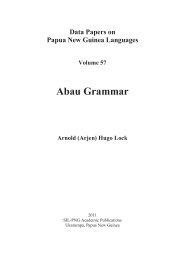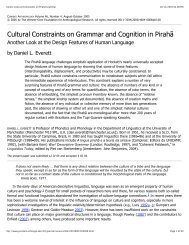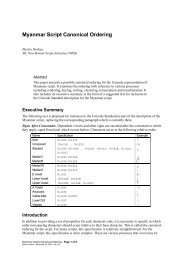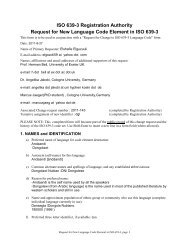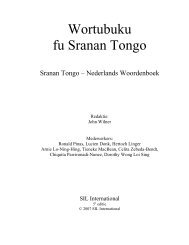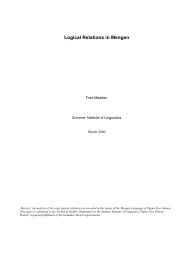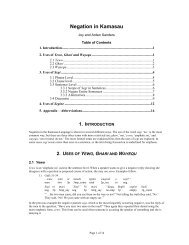A Comprehensive Comparison of Lexemes in the ... - SIL International
A Comprehensive Comparison of Lexemes in the ... - SIL International
A Comprehensive Comparison of Lexemes in the ... - SIL International
Create successful ePaper yourself
Turn your PDF publications into a flip-book with our unique Google optimized e-Paper software.
5<br />
Compil<strong>in</strong>g comprehensive dictionaries also enables us to f<strong>in</strong>d secondary<br />
mean<strong>in</strong>gs that may not be elicited with a wordlist based on an LWC, such as those<br />
listed <strong>in</strong> Table 1.3 from various Tannese languages.<br />
Table 1.3. Some Tanna lexemes with idiosyncratic secondary mean<strong>in</strong>gs.<br />
Primary mean<strong>in</strong>g<br />
be heavy<br />
death<br />
heav<strong>in</strong>ess<br />
sit<br />
smallness<br />
split lengthwise<br />
summit<br />
Secondary mean<strong>in</strong>g<br />
be pregnant, be serious<br />
sickness, trial<br />
unity<br />
mourn, be married<br />
childhood<br />
<strong>in</strong>terpret<br />
complete<br />
In this study, when lexemes have multiple, related mean<strong>in</strong>gs, <strong>the</strong> various<br />
mean<strong>in</strong>gs are separated by semicolons. The primary mean<strong>in</strong>g is listed first and<br />
additional mean<strong>in</strong>gs are listed follow<strong>in</strong>g it. The mean<strong>in</strong>gs least directly related to<br />
<strong>the</strong> primary mean<strong>in</strong>g are listed last. This is illustrated <strong>in</strong> example (1):<br />
(1) canoe; ship; village; generation<br />
Here, ‘canoe’ is <strong>the</strong> primary mean<strong>in</strong>g; ‘ship,’ ‘village,’ and ‘generation’ are<br />
additional mean<strong>in</strong>gs. ‘Ship’ is <strong>the</strong> most closely related to ‘canoe’ and <strong>the</strong>refore<br />
listed first, while ‘generation’ is <strong>the</strong> least directly related to ‘canoe’ and <strong>the</strong>refore<br />
listed last.<br />
1.3.1.2 Potential for errors <strong>in</strong> a Swadesh wordlist<br />
Tryon (1976) published a comparison <strong>of</strong> nearly 300 lexemes spoken <strong>in</strong> 179<br />
locations throughout Vanuatu, <strong>in</strong>clud<strong>in</strong>g 14 locations on Tanna. It was a sem<strong>in</strong>al<br />
work, show<strong>in</strong>g not only lexical similarity <strong>of</strong> languages and dialects throughout<br />
Vanuatu but also describ<strong>in</strong>g <strong>the</strong> phonology <strong>of</strong> each <strong>of</strong> <strong>the</strong>se languages and<br />
dialects. However, a survey <strong>of</strong> that sort—even one done by as apt a l<strong>in</strong>guist as<br />
Tryon—is likely to produce <strong>the</strong> follow<strong>in</strong>g types <strong>of</strong> errors:<br />
1) Synonym mismatch<br />
The l<strong>in</strong>guist tries to elicit a lexeme and <strong>in</strong>formants <strong>in</strong> some languages give one<br />
word while <strong>in</strong>formants <strong>in</strong> related languages give a synonym ra<strong>the</strong>r than <strong>the</strong><br />
actual lexeme <strong>the</strong> l<strong>in</strong>guist is look<strong>in</strong>g for. Even though <strong>the</strong> correspond<strong>in</strong>g<br />
lexeme is also present <strong>in</strong> <strong>the</strong>ir languages, <strong>the</strong> l<strong>in</strong>guist is not privy to that<br />
<strong>in</strong>formation, leav<strong>in</strong>g <strong>the</strong> l<strong>in</strong>guist with <strong>the</strong> impression that <strong>the</strong> languages differ<br />
on this lexical item.<br />
2) Grammatical mismatch<br />
The <strong>in</strong>formant misunderstands <strong>the</strong> grammatical form <strong>of</strong> <strong>the</strong> word <strong>the</strong> l<strong>in</strong>guist<br />
is elicit<strong>in</strong>g (perhaps because <strong>the</strong> l<strong>in</strong>guist is work<strong>in</strong>g <strong>in</strong> an LWC), so <strong>the</strong>




